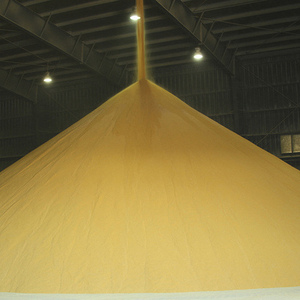Commodities: DDGS value comes down to logistics

October 1, 2014
BY Sean Broderick, CHS
August’s news continued to depress prices in September. Chinese MIR 162 (Syngenta trait corn) issues are still not resolved, leaving significant amounts of contracted tonnage that needs to move a different direction. River logistics are still an issue with barge rates that are astronomical due to harvest demand. And rail movements are still difficult, which is backing up DDGS at the origins, but still keeping delivered prices firm. There are only a finite number of railcars to go around and those that are railroad-supplied have a significant additional premium for them. Local truck logistics are going to difficult as well, as drivers move from hauling DDGS to moving harvest grains.
Still, we’ve seen increased usage in domestic hog and poultry diets. DDGS was especially valuable when soymeal was expensive during August and September and feeders used more of it. Soymeal has dropped significantly in September, causing re-evaluation of the spread between the two. But we’ve have also seen increased demand in Mexico, a result of the combination of expensive soymeal and the premiums for corn cars. Just to procure railroad cars for corn unit trains costs more than $5000 per car, above and beyond the freight, which has helped to keep DDGS competitive versus corn in delivered markets.
Looking ahead, we are still going to need to use a lot more DDGS domestically. Margins are still positive for ethanol plants, so there won’t be a decrease in supply any time soon. With railroad and barge logistics being what they are, truck sales are going to have to stay competitive enough to keep plants empty. Obviously, the grain crop is big, but lately, DDGS value all comes down to logistics.
Advertisement
Advertisement
DDGS prices
Nov 2014 Oct 2014 Nov 2013
MN 100 120 215
Advertisement
Advertisement
Chicago 105 130 242
Buffalo 120 115 208
CA 169 167 268
Florida 143 155 267
Related Stories
The European Commission on July 18 announced its investigation into biodiesel imports from China is now complete and did not confirm the existence of fraud. The commission will take action, however, to address some systemic weaknesses it identified.
The U.S. exported 31,160.5 metric tons of biodiesel and biodiesel blends of B30 and greater in May, according to data released by the USDA Foreign Agricultural Service on July 3. Biodiesel imports were 2,226.2 metric tons for the month.
CARB on June 27 announced amendments to the state’s LCFS regulations will take effect beginning on July 1. The amended regulations were approved by the agency in November 2024, but implementation was delayed due to regulatory clarity issues.
Legislation introduced in the California Senate on June 23 aims to cap the price of Low Carbon Fuel Standard credits as part of a larger effort to overhaul the state’s fuel regulations and mitigate rising gas prices.
The government of Brazil on June 25 announced it will increase the mandatory blend of ethanol in gasoline from 27% to 30% and the mandatory blend of biodiesel in diesel from 14% to 15%, effective Aug. 1.
Upcoming Events









